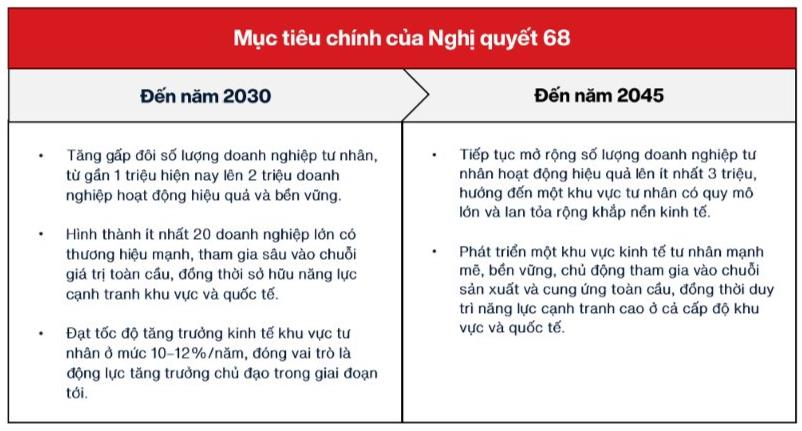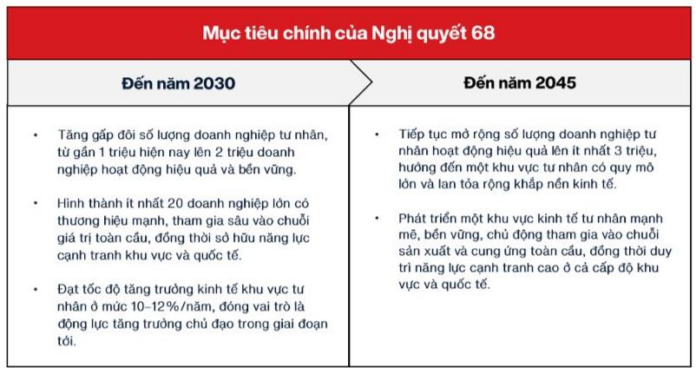Vietnam’s Political Bureau’s Resolution 68/NQ-TW is expected to bring about a significant shift in the orientation of private sector development in the country. According to Mr. Michael Kokalari, Director of Macroeconomic Analysis and Market Research at VinaCapital , this resolution has elevated the status of the private sector, clearly identifying it as the “most important driving force of the national economy.” This is a notable advancement from previous perspectives, where the private sector was often regarded as merely “a component” or “an important part” of the economy.
According to the VinaCapital Director, the core vision of Resolution 68 is to build a rapidly growing, sustainable, high-quality, and globally competitive private sector – not just serving as an economic growth driver but also taking a leading role in science, technology, and innovation. The long-term goal is to help Vietnam escape the middle-income trap and gradually realize its aspiration to become a developed, high-income country by 2045.

A notable aspect of the resolution is the goal of developing 20 large enterprises by 2030, capable of deep participation in global value chains and leading the industrialization process. This model draws inspiration from South Korea, where chaebols like Samsung and Hyundai have become pillars of national development. Vietnam hopes that supporting large-scale private enterprises to operate efficiently will boost innovation, create high-quality jobs, and enhance the economy’s resilience to fluctuations.
Resolution 68 also motivates investment funds to increase their investment in the private sector, supporting the government’s objectives. It continues to seek and expand private equity investment opportunities, providing capital for businesses to upgrade technology, expand operations, and promote growth.
Another highlight of the resolution is tax system reform towards fairness and business development support. Specifically, by 2026, the government will abolish the lump-sum tax regime for business households, encouraging them to transition to a formal enterprise model with more flexible and appropriate tax policies. In parallel, localities will have to allocate separate land funds – including a portion of the area in each industrial park – for small and medium-sized enterprises (SMEs) and innovative startups. Additionally, private enterprises will enjoy a 30% reduction in land rent for the first five years of their land lease contracts.
Resolution 68 also addresses a long-standing issue in Vietnam’s economy: the preferential treatment of state-owned enterprises (SOEs) and foreign-invested enterprises (FIEs) compared to domestic private enterprises. The government aims to comprehensively restructure SOEs in key sectors such as industry, agriculture, services, and the digital economy – including state capital divestment and facilitating deeper participation of private enterprises in these sectors. The Prime Minister has emphasized the spirit of “no limits” for private sector development, demonstrating a strong commitment to reducing the dominance of the state sector and expanding room for private sector growth.
In the opinion of Vina Capital, the significance of Resolution 68 cannot be understated. It is a landmark document that elevates the private sector as the “most important driving force of the national economy” and provides a concrete vision for developing the private sector towards rapid, sustainable, and globally competitive growth. A key objective is to form 20 large private conglomerates by 2030, following the Korean chaebol model, to spearhead innovation and economic growth. Finally, Resolution 68 is expected to play a crucial role in helping Vietnam escape the middle-income trap and achieve its goal of becoming a developed, high-income country by 2045.
Unveiling the Secrets Behind Over 500 Livestream Sessions of Vietnamese Products, Reaching 77,000 Orders and 1.2 Million Views
The power of live streaming has revolutionized the way Vietnamese agricultural products and goods are marketed, creating a powerful platform to build a strong national brand and foster sustainable economic growth.
“Nurturing Vietnam’s Future Leaders: Vinamilk Empowers Young Dreams”
The 10th ‘Good Children Following Uncle Ho’s Steps’ Congress in Hanoi was a resounding success, bringing together 500 exemplary young delegates from across the nation. This event, leading up to the 135th birthday celebration of President Ho Chi Minh, was a testament to the values and spirit of Vietnam’s beloved leader.
The Billion Dollar Green Brick: Lego’s Sustainable Bet on Vietnam’s Future
“We just want to ensure that the planet our children will inherit is still there. That it’s still functioning,” said the CEO of Lego.
“From July 1st: Coffee Shop and Convenience Store Owners are Now Mandatory Participants in Social Insurance – How Much are the Contributions?”
The expansion of compulsory social insurance coverage, especially the inclusion of registered business owners, is a significant step towards safeguarding the rights of millions of self-employed workers. This move not only ensures their protection but also fosters a more equitable and sustainable society.





















